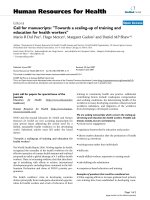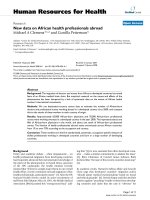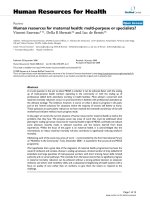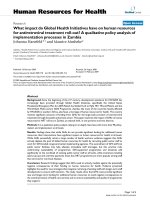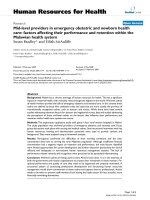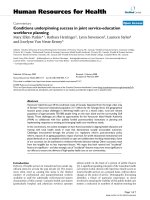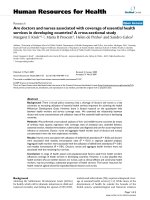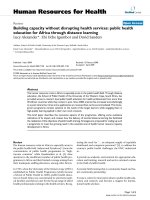báo cáo sinh học:" Understanding informal payments in health care: motivation of health workers in Tanzania" ppt
Bạn đang xem bản rút gọn của tài liệu. Xem và tải ngay bản đầy đủ của tài liệu tại đây (219.83 KB, 9 trang )
BioMed Central
Page 1 of 9
(page number not for citation purposes)
Human Resources for Health
Open Access
Research
Understanding informal payments in health care: motivation of
health workers in Tanzania
Silvia Stringhini*
1,2
, Steve Thomas
1
, Posy Bidwell
1
, Tina Mtui
3
and
Aziza Mwisongo
3
Address:
1
Centre for Global Health, Trinity College Dublin, Dublin, Ireland,
2
INSERM U687, Hôpital Paul Brousse, Villejuif, France and
3
National
Institute for Medical Research (NIMR), Dar Es Salaam, Tanzania
Email: Silvia Stringhini* - ; Steve Thomas - ; Posy Bidwell - ;
Tina Mtui - ; Aziza Mwisongo -
* Corresponding author
Abstract
Background: There is growing evidence that informal payments for health care are fairly common
in many low- and middle-income countries. Informal payments are reported to have a negative
consequence on equity and quality of care; it has been suggested, however, that they may
contribute to health worker motivation and retention. Given the significance of motivation and
retention issues in human resources for health, a better understanding of the relationships between
the two phenomena is needed. This study attempts to assess whether and in what ways informal
payments occur in Kibaha, Tanzania. Moreover, it aims to assess how informal earnings might help
boost health worker motivation and retention.
Methods: Nine focus groups were conducted in three health facilities of different levels in the
health system. In total, 64 health workers participated in the focus group discussions (81% female,
19% male) and where possible, focus groups were divided by cadre. All data were processed and
analysed by means of the NVivo software package.
Results: The use of informal payments in the study area was confirmed by this study. Furthermore,
a negative relationship between informal payments and job satisfaction and better motivation is
suggested. Participants mentioned that they felt enslaved by patients as a result of being bribed and
this resulted in loss of self-esteem. Furthermore, fear of detection was a main demotivating factor.
These factors seem to counterbalance the positive effect of financial incentives. Moreover, informal
payments were not found to be related to retention of health workers in the public health system.
Other factors such as job security seemed to be more relevant for retention.
Conclusion: This study suggests that the practice of informal payments contributes to the general
demotivation of health workers and negatively affects access to health care services and quality of
the health system. Policy action is needed that not only provides better financial incentives for
individuals but also tackles an environment in which corruption is endemic.
Published: 30 June 2009
Human Resources for Health 2009, 7:53 doi:10.1186/1478-4491-7-53
Received: 26 January 2009
Accepted: 30 June 2009
This article is available from: />© 2009 Stringhini et al; licensee BioMed Central Ltd.
This is an Open Access article distributed under the terms of the Creative Commons Attribution License ( />),
which permits unrestricted use, distribution, and reproduction in any medium, provided the original work is properly cited.
Human Resources for Health 2009, 7:53 />Page 2 of 9
(page number not for citation purposes)
Background
There is growing evidence that informal payments are, in
many low- and middle-income countries, the main source
of health care financing [1]. In this paper, informal pay-
ments will be considered as unreported or unregistered
illegal payments that have been received, in cash or in
kind, in exchange for the provision of a service (or of a
faster or better service) that is officially free [2-4].
In Poland, informal payments have been estimated to
contribute to "as much as double of the physician's sal-
ary" [5]. In Bangladesh, earnings from unofficial charges
exceeded the official salary by a factor of 10 [6], and by a
factor of five in Cambodia [7]. Recent studies have esti-
mated that unofficial fees constitute 10% to 45% of total
out-of-pocket expenditures for health care in the countries
considered [2,7-9]. Evidence of the existence of informal
payments has been found in at least 22 studies [3], almost
all referring to low-income countries.
Even if informal payments take the same form as official
fees, as pointed out by Gaal [3] they could be "the worst
possible form of private financing". First, they create a bar-
rier to the accessibility of health services [9-15], which
could affect the poor even more than official fees, due to
the unavailability of exemption policies [3] and the arbi-
trariness of the payment [16]. Second, informal payments
compromise the efficiency of health care provision by
directing resources to services that are more profitable,
rather than to those most effective [17], and to patients
who are more profitable, rather than to those most in
need [18]. Third, they create perverse incentives that
potentially represent an obstacle to health policy
[10,16,17]. Finally, the informal nature of unofficial pay-
ments undermines governments' ability to raise finances
for health [1,2] and to regulate the financing of health
care.
On the other hand, some authors have suggested that part
of "these payments can be regarded as cost-contributing
since they may ensure that staff receive their reservation
wage and stay in employment" [1,19]. In addition, some-
times patients may pay for improved services [1].
Health worker motivation and retention are increasingly
being considered a crucial response to the human
resources for health crisis, especially in low- and middle-
income countries [20,21]. In fact, the decision of health
workers to migrate to other countries or take employment
in the private sector is not due solely to demotivation
caused by insufficient salaries and extreme working condi-
tions, but is also influenced by the difficult environment
remaining workers face, having to manage staff shortages
resulting from health worker migration [22,23]. A
number of studies have confirmed the predominance of
financial incentives in determining health worker motiva-
tion and performance [24]. In fact, the relationship
between inadequate salaries and the seeking of opportu-
nities to raise earnings through charging informal fees has
been strongly suggested [1,13,25,26].
The relationship between motivation, retention and seek-
ing additional income in the public sector in the form of
informal charges may not be straightforward. The use of
such a practice can cause rivalries among health workers
due to the competition for receiving payments, as well as
the feeling of guilt and general discomfort [11]. Informal
payments can demotivate health workers more than moti-
vate them, especially in rural areas where patients are poor
and for lower cadres of workers who do not receive a high
share of the payments [11]. The extent to which each of
these two possible relationships, positive or negative,
apply has not yet been sufficiently investigated.
A clear understanding of the impact of informal payments
on the health system has not yet been reached. It is clear
that they represent a failure of the system, but Gaal's
(2006) argument that an available service still guarantees
better access to health care than no service at all needs
reviewing. For this reason and given the context of a glo-
bal health workers crisis [20], the specific relationship
between informal payments, motivation and retention of
health workers needs to be urgently investigated. Conse-
quently, the authors explore the linkages between motiva-
tion, retention and informal payments by means of a case
study from Tanzania.
Background on Tanzania
The human resource crisis is particularly severe in Tanza-
nia, as a consequence of restrictive government policies in
the last few decades that have resulted in a freeze in
recruitment of health workers [27]. The country suffers
from a critical staff shortage, particularly in rural areas.
Table 1 reports some key indicators of health and health
services in Tanzania. In 2002, there were four nurses/mid-
wives per 10 000 population, and there were only 822
physicians for the whole country [28,29].
Apart from the traditional categories of health workers
(doctors, nurses, midwives), in the Tanzanian health sys-
tem there are several non-traditional cadres that do not
hold internationally recognized qualifications. Among
these are Clinical Officers and Assistant Medical Officers,
who serve as doctors, and Nurse Aides and Medical
Attendants as substitutes for nurses. These non-traditional
cadres are also paid lower salaries than their traditional
counterparts.
Health worker motivation is a central factor in retaining
existing health workers and increasing the attractiveness
Human Resources for Health 2009, 7:53 />Page 3 of 9
(page number not for citation purposes)
of the professions [30]. In addition, the practice of charg-
ing informal payments in the health care system seems to
be fairly common in the country [11], but its relationship
with motivation and retention has not been fully
explored.
The study had three objectives: first, to assess whether,
how and in which ways informal fees occur in the case
study area of Tanzania and represent a critical issue for the
health system in the opinion of health workers; second, to
assess whether and how informal earnings help boost
health worker motivation; third, to understand in what
ways informal payments might contribute to health
worker retention in public health facilities.
Methods
The phenomenon of informal payments is extremely
complex and sensitive. The approach taken in the study
has been qualitative to allow for this. As pointed out by
Miles and Huberman [31], with qualitative research: "the
researcher attempts to capture data on the perceptions of
local actors from the inside [ ] and suspend [ ] precon-
ceptions about the topics under discussion". In addition,
qualitative research enables the researcher to "explicate
the ways people in particular settings come to understand,
account for, take action, and otherwise manage their day-
to-day situations" [31].
Since the practice investigated is illegal, the use of focus
groups was preferred, for their ability to explore a difficult
and sensitive topic [32]. In fact, focus group discussions
allow the participant to withhold self-incriminating infor-
mation, something that might not have been possible
with the use of in-depth interviews.
The research was carried out in the district of Kibaha,
Pwani region. This district is relatively close to the com-
mercial capital of Dar es Salaam but is still mainly rural.
Health facilities at different levels in the health system
were selected. The district hosts only one regional hospital
(Tumbi) and one district health centre (Kibaha Health
Centre), both of which have been included in this study.
The study was originally expected to include at least two
health dispensaries; however, due to the small number of
health workers in the dispensaries, it was possible to hold
the FGD only by stopping all other activities. This would
have been unethical, and so the study includes only one
dispensary. Health workers to be included in the study
were selected randomly from a staff list that was stratified
by cadre.
All focus groups discussions were recorded with the per-
mission of participants, according to best practice [31],
and field notes were taken. Discussions were transcribed
in KiSwahili and then translated into English.
All data were processed and analysed by means of the
NVivo software package. Discussions were coded follow-
ing the technique described by Strauss and Corbin [33],
adapted to the use of Nvivo. A list of the codes used is pro-
vided in Additional file 1. Data were reviewed line by line
and categories (Tree Nodes) were attributed to key con-
cepts. During the process, subcategories were identified
Table 1: Selected health and health system indicators of Tanzania in 2002
Births attended by skilled health personnel (%) 46
Number of physicians 822
Density of physicians per 1000 population 1.7
Number of nurses and midwives 13 292
Density of nurses and midwives per 1000 population 27.4
Number of other health workers 29 722
Density of other health workers per 1000 population 61
Total expenditure on health as % of gross domestic product 4.7
Per capita government expenditure on health at average exchange rate (USD) 7
Out-of-pocket expenditure as % of private expenditure on health 81
Source: WHO, Country health system fact sheet 2006. />Human Resources for Health 2009, 7:53 />Page 4 of 9
(page number not for citation purposes)
and subcodes (Child Nodes) were added. All the codes
were created while keeping in mind the research ques-
tions. Two out of nine documents were checked to ensure
that code-recode consistency was above 90% [31]. After
coding all documents, each Tree Node was reviewed sepa-
rately to check the appropriateness of the content.
Results
In total, nine focus groups were conducted and where pos-
sible groups were divided by cadres. Due to this require-
ment, six out of nine focus groups were held in Tumbi
regional hospital, which had a large number of employees
available for each cadre, allowing the research team to
conduct the focus groups without stopping routine activi-
ties. Furthermore, when more than one group was to be
held within the same cadre, at least one was composed of
females only.
Clinic managers acted as gatekeepers, inviting the partici-
pants to the focus groups. Seventy health workers were
approached, of whom 64 (91%) participated in the focus
group discussions (81% female, 19% male). Focus group
size varied between six and 10 participants. In total 22
midwives, 14 nurses, 11 clinical officers, 10 medical
attendants and 7 doctors took part in the study. Table 2
illustrates the composition of the focus groups.
Focus group discussions lasted between one and two
hours, depending on the size of the group and of the
cadre. In general, it was observed that the lower the cadre,
the longer the duration of the discussion. Groups com-
posed only of females tended to develop better group
dynamics than mixed ones, confirming the literature on
the topic [34]. All focus groups apart from one were car-
ried out in Swahili, with the help of a local researcher. In
the focus group held in English, it was observed that par-
ticipants were much less likely to participate and become
involved in group discussions. For this reason, the
remaining discussions were conducted in Swahili.
Job satisfaction
In general, health workers did not seem to be satisfied
with their jobs. Even though almost all participants recog-
nized that they appreciated and liked their job, they
expressed dissatisfaction because of the low salary and dif-
ficult working conditions.
"It's not necessary that I'm not feeling happy; I can be
feeling happy despite being paid little. But I'm not sat-
isfied" (Nurse, Tumbi Hospital).
Clinical officers and medical attendants tended to be
completely dissatisfied, which could be due to the fact
that these two categories, in addition to low salary and
heavy workload, suffer from an absence of job specifica-
tion. They complained that they did not know what their
duties were and were asked to do anything.
"This job is very hard and salary is low, and makes me
very unhappy" (Medical Attendant, Kibaha Health
centre).
Salary
Almost 30% of all text was coded as "salary", showing
how important this issue is for health workers. Even
though a strike of health workers in 2005 resulted in pay's
being improved by more than 70% for doctors, and by
around 30% for nurses, clinical officers and medical
attendants, salaries are still very low when compared to
the cost of living and the inflation rate, especially for
Table 2: Composition of focus groups
Participants Cadre Gender Location
Group 1 6 Nurses 1M, 5F Tumbi
Group 2 6 Midwives 6F Tumbi
Group 3 6 Nurses 6F Tumbi
Group 4 6 Midwives 6F Tumbi
Group 5 6 Medical Doctors 5M, 1F Tumbi
Group 6 7 Clinical Officers 5M, 2F Tumbi
Group 7 10 Mixed 10F Dispensary
Group 8 10 Midwives 10F Health Centre
Group 9 7 Med. Attendants 6F, 1M Health Centre
Human Resources for Health 2009, 7:53 />Page 5 of 9
(page number not for citation purposes)
lower-ranked cadres. Indeed, salary was frequently
reported as insufficient when compared to needs and
workload.
"We are seriously living in a hard condition: salary
itself can never sustain even food for the whole
month, not to talk about school fees for our school-
children" (Health Worker, Dispensary of Mwen-
dapole).
"On my side the work is good but the payment is very
low comparing to the work we do" (Midwife, Tumbi
Hospital).
Often health workers experienced consistent delays in
payment or missing refunds of travel expenses. Moreover,
salary was not perceived as adjusted for risks and for
responsibilities.
Coping strategies
When asked to discuss the strategies adopted in order to
cope with the difficult situation, health workers men-
tioned the possibility of borrowing money, reducing
expenses, relying on labour unions, running small private
businesses, growing vegetables to sell at the market, doing
extra jobs not in the health sector, working in the private
sector as health professionals, and charging informally for
services.
Moving to the private sector and especially to jobs with
nongovernmental organizations was described as an
opportunity, but only for doctors and nurses. This could
help to explain the lower job satisfaction noticed among
other cadres. However, participants reported that the pri-
vate sector, even if it offers higher salaries and better work-
ing conditions, given the availability of drugs and
equipment, lacks job security and is profit-oriented.
"For those who are running to the private sector, it is
because of salary but some hate to be in the private
sector simply because there is no job security, people
are offended, there's no job satisfaction, there are tyr-
annies, and you can even lose the job anytime. Bad
enough, in private sector you can learn some behav-
iours that we never expect from the public sector sim-
ply because they're profit minded" (Medical Doctor,
Tumbi Hospital).
The issue of job security was found to be particularly
important for health workers; some even stated that they
would not have accepted even double salaries offered in
the private sector because job security was not guaranteed.
All groups raised and discussed this issue, even if it was
not included in the focus group guidelines. The value
given to job security can be due to the high unemploy-
ment rate and to the low recruitment rate in the public
sector. In case of job loss, the possibility of being unem-
ployed for a long time was seen as extremely high.
Informal payments
Evidence of the existence and use of informal payments in
the selected health facilities was confirmed, even if not
every participant agreed that they themselves accepted
informal payments. Sometimes participants recognized
that the phenomenon may exist in other health facilities,
but not in theirs (Tumbi Hospital). Different typologies of
informal payments were described. Interestingly, partici-
pants frequently commented that unofficial payments
were more commonly patient-initiated than provider-led:
"There are two different languages about this issue,
one is when the health workers force the patients to
give payments to them before service and this situa-
tion is not so common to happen, since the health
workers will not be sure of the identity of the patients
who could be a policemen or related. Second is when
patients themselves force the health workers to receive
gifts and money from them and this is very common.
Most of the patients have the idea that to get a quality
service then they should give the health workers some-
thing so that they will be much considered" (Clinical
Officer, Tumbi Hospital).
The interpretation of this is quite tricky, as staff may wish
to defend their integrity in the focus groups while defend-
ing the practice of charging. The fact that it is the patient
offering the payment to the health worker may not
exclude the compulsory nature of the fee. An "unwritten"
rule known by both actors could be in operation. Never-
theless, the patient seems to be empowered by paying
fees. Patients pay in order to obtain better or faster serv-
ices, for example, by jumping the queue.
Staff and particularly doctors were also recommending
patients to services or treatments in their own private prac-
tice:
"They [doctors] just tell them: this is the address of my
clinic, come this afternoon, come tomorrow. This is
the normal thing" (Nurse, Tumbi Hospital).
The amount taken as an informal payment seems to vary
with the category of health worker. It is generally between
500 and 2000 Tanzania shillings (TZS; TZS 1000 = EUR
0.53) for medical assistants or nurses, but could be much
higher for doctors and specialists, where amounts from
TZS 10 000 to TZS 200 000 were mentioned.
Participants in all the groups recognized that the main rea-
son for informal payments from the provider perspective
Human Resources for Health 2009, 7:53 />Page 6 of 9
(page number not for citation purposes)
was the inadequacy of salaries when compared to the
needs of staff. All groups reported having difficulties in
facing all the expenses until the end of the month, and
even if they admitted not to be happy with the situation,
they generally perceived the practice of asking for bribes as
necessary and justified by the situation.
"Just imagine if a nurse or a doctor leaves nothing at
home for that day. It's easy thing and normal for a per-
son to ask for bribes in any places, so it is in the hos-
pital. If one could be paid well and could provide for
his family, he could live in peace and attend patients
well" (Midwife, Tumbi Hospital).
Inadequate working conditions, disproportionate work-
load, absence of risk allowances or transport allowances
and shortages of health care workers have also been men-
tioned as reasons to explain the practice from the provid-
ers' perspective.
The health care workers reported that sometimes informal
payments were proposed by patients motivated by the
belief of getting higher quality services or by the need or
desire to be treated sooner.
Widespread corruption in the government, in the whole
public sector and of top managers and clinic managers in
the health sector was also mentioned as a factor that could
justify and encourage the same practice to be adopted
throughout the health system.
When asked to describe how the phenomenon could
affect the health system, all participants agreed that access
to health care was seriously compromised by this practice.
It appears that poor people are unable to afford even pri-
mary care, while the majority of the population cannot
access specialized services at all in urban public hospitals.
"Those who can't manage to bribe; they will all die
since they will never be able to access the treatments.
Just imagine the women who are about to deliver, or
children and those who are really sick, or the poor: do
you think they will survive? They will all die just for
[inability to make] informal payments" (Midwife,
Tumbi Hospital).
Very frequently health workers reported that not only
access to but also quality of the health system was seri-
ously compromised by this phenomenon. Informal pay-
ments create competition among health workers and
induce dangerous, income-seeking behaviours and direct
staff attention to profitable patients/services instead of
necessary ones. Participants also mentioned that informal
payments could damage the reputation of the category of
health workers and of the hospitals involved.
Informal payments, motivation and retention
The analysis of the perceived relationship between infor-
mal payments, and motivation and retention in the public
health sector has yielded controversial and discordant
results. For the majority of groups, informal payments
were one of the strategies by which health workers cope
with salaries that are sometimes below a reasonable level,
but were not the reason for staying in the public sector.
"I just want to say that those who are engaged in infor-
mal payments are not happy of that. They are forced
by a hard environment and their little income"
(Health Worker, Dispensary of Mwendapole).
Many participants also described the circumstance in
which, having paid a little bribe, the patient felt entitled
to control the health worker through the entire episode of
illness. This was the main demotivating factor for health
workers in accepting informal payments.
"Patients themselves, after giving something, do con-
trol the health workers. You find that they don't
respect the hospital regulations simply because of the
favour that they gave to the health workers" (Doctor,
Dispensary of Mwendapole).
"Bribery is a torture to health attendants, because even
when you succeed to receive bribery from a person or
patient then you will be locked to him, for he won't
allow you to serve anyone else than him" (Midwife,
Tumbi Hospital).
"To me, informal payments demotivate a health
worker and destroy her/his performance because
when the sick person will recognize that you ask them
for informal payments they will make you a slave and
control you. And even sometimes they might report
the issue to the police and you'd be punished, includ-
ing losing your job" (Health worker, Dispensary of
Mwendapole).
The consequent "slavery" to the patient was perceived as
humiliating and degrading.
"We are humiliated a lot if we will go on receiving
bribes from patients, and also we will lose patients,
which makes us not to be trusted, because there are
many who are unable to give bribery. Those who are
rich will get well, but those who are not capable will
die earlier" (Midwife, Tumbi Hospital).
The fear of being caught or accused was another main
source of discomfort and demotivation.
"When you receive bribery you become uncomforta-
ble, you become afraid, you become insecure in such
Human Resources for Health 2009, 7:53 />Page 7 of 9
(page number not for citation purposes)
a way that sometimes when you hear a knock in your
office you are afraid or if one talks about bribery you
are confused. We don't like this situation, really it's
not good" (Midwife, Tumbi Hospital).
The discomfort of being involved in a situation they knew
had serious consequences for poor peoples' access to
health services was also reported very frequently.
"On my side bribery is a trouble and a disturbance,
and pity to those who are unable to give anything to
be treated" (Midwife, Tumbi Hospital).
Another issue described was the competition that infor-
mal payments created among and within cadres. Since it
is unlikely that a patient or his relatives can afford to bribe
all the health workers involved in their treatment during
an illness episode, they would have to select whom to cor-
rupt; this was a source of rivalry and discontent.
However, in general other factors were more important in
the decision to stay in the public sector. Job security was
identified as the most important factor. In addition,
opportunities for further education and training were con-
sidered important by certain categories, such as nurses
and midwives. Clinical officers, instead, reported that the
peculiarity of their category would not allow them to
switch to the private sector or to migrate so easily. All cat-
egories, apart from specialists, conveyed that migration to
other countries would have been difficult because they
were not fluent in English, as Swahili was more com-
monly spoken and written.
As expected, given the reasons reported for the existence of
informal payments, health workers' proposals on how to
reduce the problem were all focused on incentives. The
need to obtain salary increases was reported by all groups.
After that, they mentioned the need to increase working
conditions through better equipment, training opportuni-
ties and better management. The possibility of being com-
pensated for risks and transport fees, night work and
uniforms was often described as important in increasing
job satisfaction and loyalty to the government, therefore
decreasing illicit behaviour.
In addition, they mentioned the importance of imple-
menting policies discouraging corruption in the entire
public system by increasing accountability and transpar-
ency. Increasing patients' awareness of the issue and edu-
cating people to respect rules was also seen as crucial.
Discussion
Informal payments have been reported to be very com-
mon in Tanzania in all levels of care and among all health
worker categories. The amount paid varied depending on
the services required and seemed to rise with the increase
of specialization. These payments have been described as
a coping strategy employed to respond to the circum-
stance of earning a salary that is insufficient to cover basic
needs and incompatible with workload, responsibilities
and risks taken. Based on the results of this study, it seems
that informal payments are a form of financial incentive
that also has substantial negative effects on motivation,
contradicting the hypothesis of their possible positive
impact on motivation.
A new framework for informal paymentsFigure 1
A new framework for informal payments.
Low Salary
Widespread corruption, bad management,
lack of transparency
Lack of incentives
Inadequate infrastructures and
equipments, staff shortages
Job
Dissatisfaction
De-motivation
INFORMAL
PAYMENTS
Retention
Job
Security
Access to health-care
Lack of
alternatives
Human Resources for Health 2009, 7:53 />Page 8 of 9
(page number not for citation purposes)
A synthesis of the framework of informal payments as it
emerged from this study is presented in Figure 1. A gener-
ally widespread discontent of health workers was
observed. They appeared to be demotivated, dissatisfied
and unhappy with their profession and their working
environment. The same reasons behind job dissatisfaction
were found to be behind the providers' justification of
informal payments.
Surprisingly, though, based on the results of this study, it
appears that most health workers are demotivated by
accepting informal payments, rather than motivated. It
seems that informal payments are asked for and accepted,
but only because it is the easiest way of coping with a sal-
ary that is not in line with their needs and workload.
Informal fees, while increasing financial incentives, may
at the same time lower motivation. In fact, informal pay-
ments are a particular form of financial incentive that is
associated with other factors, such as fear of being
detected, loss of self-esteem, a sense of guilt and humilia-
tion.
Informal payments contribute to an environment of cor-
ruption and dishonesty that in turn creates dissatisfaction,
discomfort and demotivation among health workers. This
may be true for all cadres apart from doctors. This study
suggest that doctors, and particularly specialists, practise
dual jobs in the majority of cases; they often use their pub-
lic job to maintain their reputation and recruit their
patients for their private clinics. However, the practice of
shifting patients from the public sector to the private sec-
tor is slightly different from charging informal fees for the
provision of services offered in the public facilities, even if
it can have the same effects for patients.
Results from this study suggest that informal payments
contribute a little to retention in public health facilities, or
they would not occur, but they do not contribute to moti-
vation. Informal payments may help push health workers'
salaries over the subsistence level, but at the expense of
making them unhappier.
Nevertheless, there are other contributing factors to reten-
tion, including a context of high unemployment, tempo-
rary jobs and an absence of labour rights and some degree
of public sector job security. In Tanzania, as noted, the
lack of English fluency represents a great obstacle to
migration.
Furthermore, certain health categories, such as clinical
officers, medical assistants and nurse's aides, have been
created with the special purpose of not being "exporta-
ble". Therefore, if other, more attractive jobs are not avail-
able, the benefits of staying in the public sector, however
low, may seem higher than the alternatives, such as unem-
ployment or subsistence farming.
This study had several limitations. The study was inform-
ative and exploratory, and the findings cannot be general-
ized outside of similar contexts. Moreover, possible biases
could have occurred in the selection of participants. Par-
ticipants were chosen randomly whenever possible, but
the gatekeepers carried out the selection. It is therefore
possible that the gatekeepers purposely chose more loyal
health workers to preserve the reputation of the clinic.
This may have led to an underestimation of the phenom-
enon of informal payments.
Furthermore, the need to divide by cadres and ensure the
continuance of the activity in the clinics limited the
number of health workers involved in the study, and this
could have hampered the richness of the discussions. The
generalizability of this study is limited by the size and
methodology adopted. Results are therefore applicable
only in similar contexts.
Conclusion
This study suggests that, at least in this context, informal
payments may demotivate health workers more than
motivate them. This can be explained by negative factors
involved with this practice, such as fear of detection, loss
of self-esteem and sense of guilt, which counterbalance
the positive financial incentives.
This study suggests that, with the possible exception of
doctors, informal payments probably do not contribute
much to the retention of health workers. On the contrary,
other factors such as job security and lack of alternative
employment may play a more important role in retaining
staff.
As suggested by health workers in this study, the practice
of informal payments contributes to the general demoti-
vation of health workers and negatively affects access to
health care services and quality of the health system. Even
though further research is needed on the topic, the picture
that has emerged requires urgent policy action. It is not
just better financial incentives that are needed, but an
environment in which corruption is endemic needs to be
addressed, as it is believed that the reduction of informal
payments will have a positive effect on access to and qual-
ity of health care.
Competing interests
The authors declare that they have no competing interests.
Authors' contributions
SS contributed to the conception and design of the study
and acquisition and interpretation of data; performed
Human Resources for Health 2009, 7:53 />Page 9 of 9
(page number not for citation purposes)
main analyses; and wrote the original and successive
drafts of the paper.
ST contributed to the conception and design of the study,
contributed to interpretation of data and revised critically
each draft. PB contributed to the conception and design of
the study, contributed to interpretation of data and
revised critically each draft. TM contributed to the design
of the study and the acquisition of data. AM contributed
to the conception and design of the study. All authors read
and approved the final manuscript.
Additional material
Acknowledgements
The authors would like to thank the staff of HRH-NIMR (Human Resources
for Health, National Institute for Medical Research) in Dar es Salaam for the
support provided.
Silvia Stringhini is extremely thankful to the Rotary International Founda-
tion and Collegio Ghislieri (Pavia, Italy) for the scholarships awarded, which
have allowed her to attend and earn the MSc in Global Health.
References
1. Ensor T, Witter S: Health economics in low income countries:
adapting to the reality of the unofficial economy. Health Policy
2001, 57:1-13.
2. Balabanova D, McKee M: Understanding informal payments for
health care: the example of Bulgaria. Health Policy 2002,
62:243-327.
3. Gaal P, Belli P, McKee M, Szócska M: Informal payments for
health care: definitions, distinctions, and dilemmas. Journal of
Health Politics, Policy and Law 2006, 31:251-293.
4. Lindelow M, Serneels P: The performance of health workers in
Ethiopia: results from qualitative research. Social Science and
Medicine 2006, 62:2225-2235.
5. Chawla M, Bermana P, Kawiorska D: Financing health services in
Poland: new evidence on private expenditures. Health Econom-
ics 1998, 7:337-346.
6. Killingsworth J, Hossain N, Hedrick-Wong Y, Thomas S, Rahman A,
Begum T: Unofficial fees in Bangladesh: price, equity and insti-
tutional issues. Health Policy Plan. 1999, 14(2):152-163.
7. Barber S, Bonnet F, Bekedam H: Formalizing under-the-table
payments to control out-of-pocket hospital expenditures in
Cambodia. Health Policy Plan. 2004, 19(4):199-208.
8. Chawla M, Berman P, Windak A, Kulis M: Provision of ambulatory
health services in Poland: a case study from Krakow. Soc Sci
Med. 2004, 58(2):227-235.
9. Falkingham J: Poverty, out-of-pocket payments and access to
health care: evidence from Tajikistan. Soc Sci Med. 2004,
58(2):247-258.
10. Balabanova D, McKee M, Pomerleau J, Haerpfer C: Health service
utilization in the former soviet union: evidence from eight
countries. Health Services Research 2004, 39:1927-1950.
11. Mæstad O, Mwisongo A: Informal Payments and the Quality of
Health Care in Tanzania: Results from Qualitative Research.
CMI Working Paper 2007 2007.
12. McPake B, Asiimwe A, Mwesigye F, Ofumbi M, Ortenblad L, Stree-
andd P, Turinde A: Informal economic activities of public
health workers in Uganda: implications for quality and acces-
sibility of care. Social Science and Medicine 1999, 49:849-865.
13. Muula A, Maseko F: How are health professionals earning their
living in Malawi? BMC Health Serv Res 2006, 6:97.
14. Schwalbach J, Abdula M, Adam Y, Khan Z: Good Samaritan or
exploiter of illness: coping strategies of Mozambican health
care providers. Studies in Health Services Organisation & Policy 2000,
16:121-134.
15. Vian T, Grybosk K, Sinoimeri Z, Hall R: Informal payments in gov-
ernment health facilities in Albania: results of a qualitative
study. Soc Sci Med 2005, 62(4):877-887.
16. Lewis M: Who is Paying for Health Care in Eastern Europe
and Central Asia? In The International Bank for Reconstruction and
Development The International Bank for Reconstruction and Develop-
ment. The World Bank; 2000.
17. Ensor T: The unofficial business of health care in transitional
Europe. Eurohealth 2000, 6:1-79.
18. Adams O, Hicks V: Pay and Non-Pay Incentives, Performance
and Motivation. Geneva, The World Health Organisation. Global
Health Workforce Strategy Group; 2000.
19. Van Lerberghe W, Conceica C, Van Damme W, Ferrino P: When
staff is underpaid: dealing with the individual coping strate-
gies of health personnel. Bulletin of the World Health Organization
2002, 80:581-584.
20. Chen L, Evans T, Anand S, Boufford J, Brown H, Chowdhury M, Cueto
M, Dare L, Dussault G, Elzinga G, Fee E, Habte D, Hanvoravongchai
P, Jacobs M, Kurowski C, Michael S, Pablos-Mendez A, Sewankambo
N, Solimano G, Stilwell B, de Waal A, Wibulpolprasert S: Human
resources for health: overcoming the crisis. Lancet 2004,
364:1984-1990.
21. Hongoro C, McPake B: How to bridge the gap in human
resources for health. Lancet 2004, 364:1451-1456.
22. Connell G, Zurn P, Stilwell B, Awases M, Braichet J: Sub-Saharan
Africa: beyond the health worker migration crisis? Social Sci-
ence and Medicine 2007, 64:1876-1891.
23. Ogilvie J, Mill E, Barbara A, Fanninga A, Opareb M: The exodus of
health professionals from sub-Saharan Africa: balancing
human rights and societal needs in the twenty-first century.
Nursing Inquiry 2007, 14:114-124.
24. Willis-Shattuck M, Bidwell P, Thomas S, Wyness L, Blaauw D, Ditlopo
P: Motivation and retention of health workers in developing
countries: a systematic review. BMC Health Services Research
2008, 8:247.
25. Gaal P, McKee M: Fee-for-service or donation? Hungarian per-
spectives on informal payment for health care. Social Science
and Medicine 2005, 60:1445-1447.
26. Lewis M: Informal payments and the financing of health care
in developing and transition countries: Informal payments to
providers are often an implicit form of insurance against
future health care needs. Health Affairs 2007, 26:984-997.
27. Schwerzel P, Munga M, Laterveer L: Partners in International
Health, Equity implications of health sector user fees in Tan-
zania. Research for Poverty Alleviation 2004.
28. WHO: The World Health Report – Working Together For
Health. 2006.
29. WHO: Country Health System Fact Sheet 2006, United
Republic of Tanzania. 2006.
30. COWI, Goss Gilroy, EPOS: Joint External Evaluation of the
Health Sector in Tanzania 1999–2006. Ministry of Foreign
Affairs of Denmark; 1994.
31. Miles M, Hubermen M: Qualitative Data Analysis London: Sage; 1994.
32. Morgan D, Krueger R: When to use focus groups and why. In
Successful Focus Grups: Advancing the State of the Art Newbury Park,
CA: Sage; 1993.
33. Strauss A, Corbin J: Basics of Qualitative Research: Grounded Theory Pro-
cedures and Techniques Newbury Park, CA: Sage; 1990.
34. Krueger R: Focus Groups: A practical Guide for Applied Research London:
Sage; 1994.
Additional file 1
Code list. Table exceeding one A4 page in length.
Click here for file
[ />4491-7-53-S1.doc]
